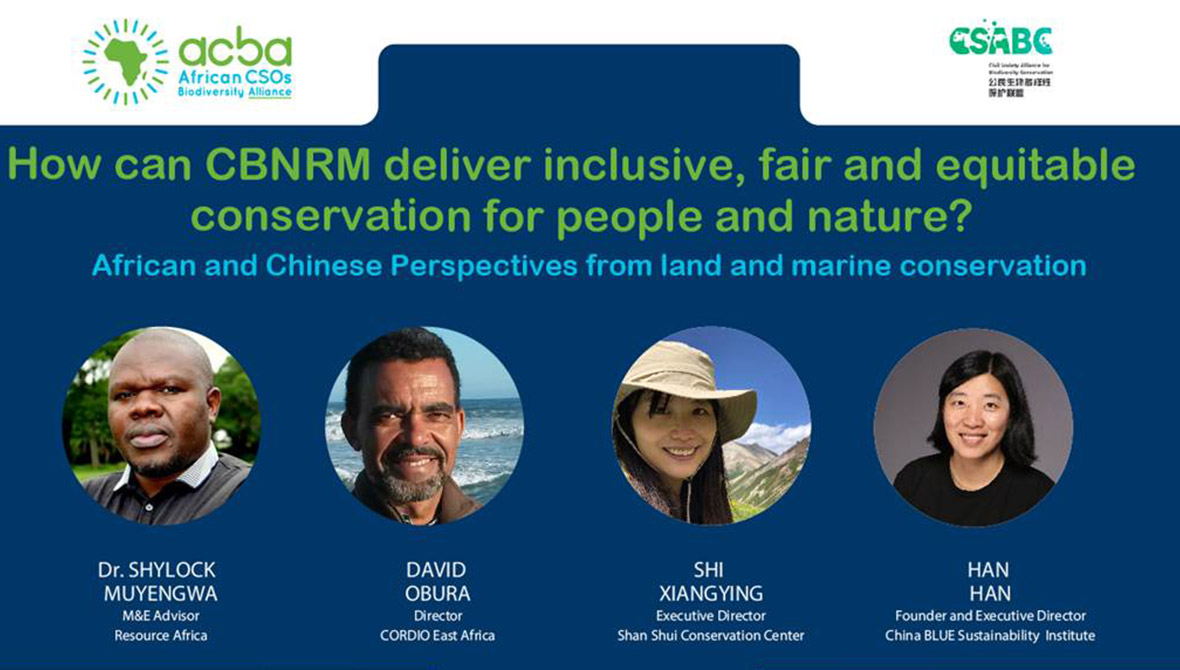African and Chinese CSOs Convene to Explore Community-Based Natural Resource Management
General Inquiries
Tel:+254 711 063 000
Ngong Road, Karen, P.O. Box 310
00502 Nairobi, Kenya

The African CSOs Biodiversity Alliance (ACBA) in collaboration with China’s Civil Society Alliance for Biodiversity Conservation (CSABC) hosted a webinar to highlight African and Chinese perspectives on “how community-based natural resource management (CBNRM) can deliver inclusive, fair and equitable conservation for people and nature” in land and marine conservation. The webinar was held on April 1, 2021.
All 54 African countries and China ratified the global CBD convention and are actively pursuing strategies for achieving sustainable development outcomes with mutual benefits for people and nature. One of the strategies has been CBNRM, which as a concept embraces a range of ecosystem-based approaches such as nature-based solutions (NbS) and ecosystem adaptation including restoration of degraded landscapes.
This webinar aimed to illuminate how CBNRM has been used and can be taken forward in African and Chinese biodiversity conservation. The session engaged CSO professionals, related stakeholders from the ACBA and CSABC networks, and African, Chinese, and other public engaged in Africa-China relations, biodiversity conservation, and environmental civil society.
The outcomes from the webinar were to build a common understanding on how CBNRM can deliver on multiple elements of the Global Biodiversity Framework (GBF) such as nature-based solutions, ecosystem-based adaptation, other effective conservation measures (OECMs), and other approaches to promoting biodiversity. Throughout the discussion, the diversity in approaches to defining communities was evident. The importance of ensuring community resilience, taking long-term approaches to ecosystem management, and addressing challenges posed to conservation financing were highlighted across the board.
Dr. Shylock Muyengwa, Monitoring and Evaluation Advisor at Resource Africa, stated that CBNRM in Southern Africa has shown great resilience in the face of local and global challenges, adding that communities are already thinking about tackling emerging challenges including COVID-19 and shifting global norms around hunting. Pathways include diversification of the wildlife economy locally and internationally, and new mechanisms to enhancing financing resilience. He pointed out that it is also important to Resource Africa that communities participate at regional and international platforms to share emerging issues that impact their lives. Dr. Shylock emphasized that ACBA and other networks are a step towards this.
Shi Xiangying, a CSABC CSO leader in local community eco-tourism, pointed out that China has just started its CBNRM journey, and Chinese CSOs hope to learn from African stories. She further discussed wildlife’s diverse benefits: what we consume from them, what we gain intangibly, and their contribution to the environment through biodiversity. “There are costs to wildlife protection, most of which are shouldered by communities. When we transfer the benefits of protection to communities, these costs are reduced.” She further talked about the need to support communities as they compete with private companies when they engage in eco-tourism.
David Obura from CORDIO East Africa brought in perspectives on CBNRM for marine ecosystems. He mentioned that a lot of our livelihoods and global economy comes from the sea, that we are a lot more conscious of that now as there is increasing pressure on land. He pointed out that In Eastern Africa alone, over 250,000 people are dependent on fisheries. He further shared how the process of empowering small-scale fisheries on the Kenyan coast has improved community resilience by building their economic and social assets. Co-management of the fisheries with the national government (including legislation), local ownership of CBNRM, and external interest from other communities have been critical to success. CBNRM has become a flagship that inspires other marine fishing communities to start their own initiatives.
Han Han, a CSABC CSO leader in marine conservation spoke of engaging small-scale fisheries and fish farmers in responsible fishery and aquaculture on Hainan Island, in China. Han Han and her team have supported farmers to gain better and more financial and technical support. Young fish farmers are empowered through community support, as they are key to advocating for sustainable approaches and will be the leaders who ensure that fishery activities are compatible with community needs and marine conservation objectives.
In her concluding remarks Maxi Louis, the ACBA moderator of the webinar, highlighted that it is impressive that communities are increasingly involved in monitoring and evaluation processes, and that long-term sustainability is addressed in Chinese communities in comparable ways to conservation communities in Southern Africa. She also mentioned that this is the first collaboration of many to come between ACBA and CSABC.
The recording of the full webinar can be accessed here